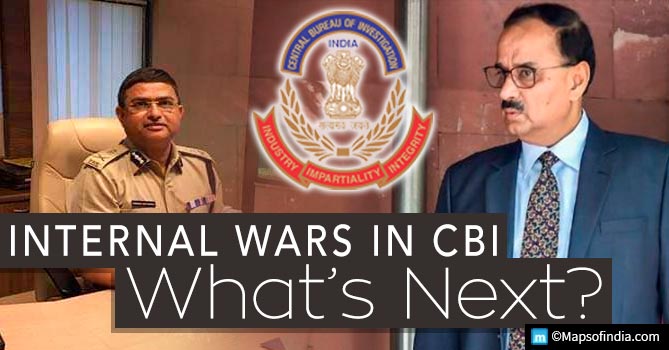
It seems like the country’s struggle with power is never-ending, with CBI being in the limelight this time around. In a series of latest developments, Alok Verma and Rakesh Asthana, namely the Director and Deputy Director of Central Bureau of Investigation (CBI), have been ousted from the bureau with immediate effect.
On October 24th 2018, the Government of India decided to step in, following the heated war between the No. 1 and No. 2 of CBI. The decision arrived after a strongly worded report from Central Vigilance Commission (CVC). While many, including Verma, question the legality of government’s action, M Nageshwar Rao, Joint Director (CBI) has been appointed as the interim chief.
What is the feud all about?
While it has only made it to the headlines recently, the internal battle at the CBI dates as far back as October, 2017. Verma had raised objections when Rakesh Asthana was first appointed as the (acting) Director of CBI, because of the former’s name in the Sterling Biotech controversy (2011). However, his complaint wasn’t heard and Asthana assumed his office in 2016.
In the past one year, the two have hurled a string of accusations at each other. The acting Director has made allegations that Verma took a bribe of Rs. 2 crore for a case, following which the latter accused him back for taking a bribe in the same case. Notably, the case in question is that of Moin Akhtar Qureshi, the controversial businessman who was also behind the downfall of two previous CBI chiefs- A P Singh and Ranjit Sinha.
The CBI officially filed six complaints, along with an FIR against Asthana, while he shot back with about a dozen allegations against the Director. On October 15th, the CBI consequently booked Asthana for taking bribes in the Qureshi case. The Delhi High Court, however, on the special director’s appeal, directed the CBI to not take any action against the special director.
How does the Rafale deal fit in?
The current controversy is being seen in the country as “CBI vs CBI”. However, there are more layers to the story than the surface controversy. Congress President Rahul Gandhi, who fondly calls Asthana, PM Modi’s “blue-eyed” boy, has made allegations that the government removed Verma from his post to stop him from probing into the controversial Rafale deal.
“CBI Chief Alok Verma was collecting documents relating to the Rafale scam. He was forcibly sent on leave. The Prime Minister’s message is very clear that whoever comes near Rafale (issue) will be removed, wiped out”, he was quoted as saying.
Truthfully, however, there were multiple crucial cases on Verma’s table when he was asked to step down. Some of them were: the case of Rafale deal, complaint against the PM’s secretary etc. The case of Sterling Biotech, in which Asthana’s name had come up, is another case under Alok Verma. Naturally then, the opposition has raised doubts over Verma’s immediate stepping down, with leaders like Arvind Kejriwal now joining in.
A simple case of internal battles?
Finance Minister, Arun Jaitley has brushed off the allegations against the government for allegedly removing Verma and Asthana against the law. According to him, the Central Vigilance Commission (CVC) and the Central Government hold the authority to superintend the bureau. Talking to the media, he has said that the move was “to maintain the institutional integrity of the CBI, purely as an interim measure”. With the new director in seat, 14 CBI officers have so far been transferred.
With politics around the Rafale deal raising its head in the CBI matter, it is no longer a simple case of internal unrest.
The road ahead
The Apex Court will hear Verma’s plea on October 26th, regarding the government’s decision to send him on leave. The bench will comprise the newly appointed Chief Justice, Ranjan Gogoi. The court has decided it is a plea that requires an urgent hearing. In his statement, Alok Verma has stressed on the need for the country to have an “independent” CBI. Talking about the current upheaval, he says it happened because “certain investigations into high functionaries [did] not take the direction that may be desirable to the government”.
While the country is waiting in anticipation for the Supreme Court’s verdict, Verma’s indirect hinting at the government’s discomfort has unleashed a new set of allegations from the opposition’s hand. Congress party has declared a nation-wide protest on October 26th.
Whatever direction the ball will now roll in, one thing is certain, the name of CBI has been tarnished in public’s eyes. There is a need to take another look at the bureau’s structure, and make sure it succeeds in acting as a truly “independent” institution.





